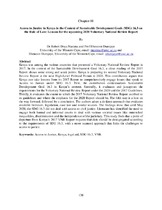| dc.description.abstract | Kenya was among the various countries that presented a Voluntary National Review Report in 2017. In the context of the Sustainable Development Goal 16.3, a close reading of the 2017 Report shows some strong and weak points. Kenya is preparing its second Voluntary National Review Report at the next High-Level Political Forum in 2020. This contribution argues that Kenya can take lessons from its 2017 Report to comprehensively engage issues that speak to Access to Justice under SDG 16.3. First, the contribution contextualizes Sustainable Development Goal 16.3 in Kenya’s context. Secondly, it evaluates and juxtaposes the requirements for the Voluntary National Review Report under the 2020 and the 2017 Guidelines. Thirdly, it evaluates the extent to which the 2017 Voluntary National Review Report ascribed to its guidelines and where the emphasis for the 2020 Report should be. The fifth step is a hint on the way forward; followed by a conclusion. The authors adopt a desktop approach that evaluates available literature, legislation, case law and similar sources. The findings show that until May 2020, the SDG 16.3 did not deal with access to civil justice. Literature has identified the need to engage both formal and informal courts to deal with various societal issues like entrenched inequalities, discrimination and the independence of the judiciary. This study finds that a point of departure from Kenya’s 2017 VNR Report requires that data should be desegregated according to the requirements of SDG 16.3, with a more nuanced approach that links the challenges to access to justice. | en_US |

